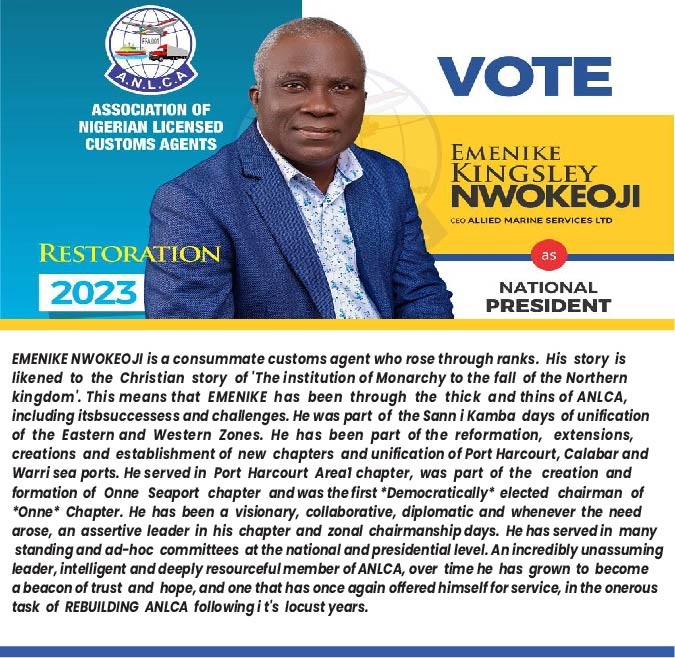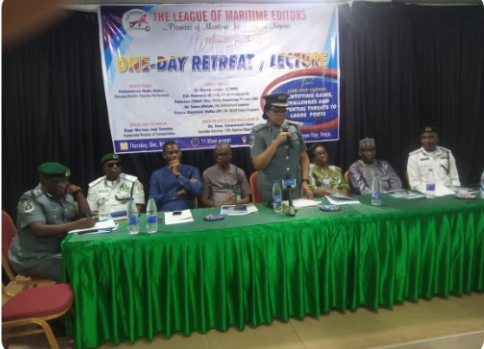…As LOME Advocates Strengthening of Interconnectivity
BY EGUONO ODJEGBA

Port operators and players yesterday offered sharp and distinct views about the projected gains and economic dynamics of the Lekki Deep Seaport (LDSP) expected to begin shipping operations soonest, possibly before the beginning of the new year; going by the federal government ‘s announcements of late.
Although the stakeholders who gathered at the Lagos Airport Hotel Ikeja Friday for a One- Day Retreat/Lecture organized by the League of Maritime Editors (LOME) with the theme “Lekki Deep Seaport: Identifying Gains, Challenges And Potential Threats To Lagos Ports”, agreed that the emergence of LDSP does not constitute real threats to the Lagos ports, they were sharply divided on factors that belie the positive hypes so far associated with the new deep seaport.
While the Seaport Terminal Operators Association of Nigeria (STOAN) was concerned that the LDSP is a disaster waiting to happen except adequate infrastructural needs of the seaport are addressed, the Nigerian Ports Authority (NPA) on the other hand says the LDSP as designed is unassailable a game changer that will redefine ports operations in Sub Sahara Africa.
According to STOAN Chairperson, Dr. Vicky Haastrup, despite all the positive things that have so far been said about the LDSP, it is still in need of adequate cargo haulage road networks and rail connectivity in view of the current traffic situation along the axis; which she says cannot even adequately support ordinary cosmopolitan movement.
The STOAN Chairperson who was represented by the Public Relations Officer, Dr. Bolaji Akinola, urged government, promoters and builder of the seaport to return to the original port design to address the missing links as a matter of urgency and necessity, and not wait until another Apapa port traffic situation is re-enacted.
Akinola who provided a disturbing graphic explanation of the traffic snarl along the axis noted it takes commuters 3 to 4 hours to drive to the seaport from the mainland and same time on their return trip; saying port business under such un-salutary circumstances is a silent killer to business and port users.
The STOAN spokesman who averred that the situation does not require propaganda or diplomacy, noted that the only sure and proper response would be to address the required but missing infrastructure, particularly rail connectivity and use of barges; as he said the possibility of expanded road net work has become slim, since the vast stretch of land from Lekki Phase One to the location of the seaport has all been bought; he lamented.
His words: “The Lekki port without rail evacuation is a disaster in waiting for traffic operations along the Lekki-Epe expressway. I go to the Pan Atlantic University in Ibeju-Lekki from Ikoyi once a week. Every time I go towards that axis, I spend three hours on the road, stuck in traffic, and another three hours coming from Lekki to Ikoyi.
“This is currently the situation even when we don’t have large numbers of trucks on that road because Lekki port has not commenced operations. By the time Lekki port commences operations and about a thousand trucks besiege Lekki roads, traffic along that corridor will be a disaster.
“The land around the Lekki Free Trade Zone has all been bought, and when 1000 trucks hit the road what would happen? Abnitio, rail connectivity should have been built into the blueprint. Unless cargoes are evacuated through other means like barges, the commencement of Lekki port which will invite large numbers of trucks to that corridor will lead to another traffic gridlock along that axis.”
STAON further noted that whereas the old Lagos ports are expected to serve as feeder ports, there are obvious infrastructural challenges that must also be addressed to make them fit to complement the new deep seaport, and called on the federal government to grant NPA revenue remittance holiday and a moratorium of a number of years to to enable it fully rehabilitate the old ports.
“The quay aprons at Apapa and Tin Can ports are giving way, they are over 40 years and ripe for decay and rebuilding. Even the perimeter fence at Tin Can has also given way, NPA has the money to fix them, but the federal government is taking all the money. Federal Government should grant NPA a revenue remittance holiday and moratorium to be able to fix the broken down infrastructure. Private operators should also be encouraged to support the expansion of the port roads”, he said.
However, the NPA Managing Director, Mohammed Bello-Koko, represented by Assistant General Manager, Operations, Mr. Ayo Durojaiye allayed such fears even as he informed that the LDSP rather than pose as threat to the existing Apapa and Tin Can Island ports, would serve a complementary role.
In a presentation titled ; “Lekki Deep Seaport: Gains, Challenges and Potential Threat To Lagos Port”, Bello-Koko described the new deep seaport as changing the landscape of port operations, even as he agreed the existence of the constraints of hinterland connectivity.
Bello-Koko said : “It is worthy of note that with the level of preparedness for the take-off of Lekki Port and the commencement of commercial operations in Q1 2023 would be a game changer in port operations not only in Nigeria but West Africa sub-region”
While he advanced key features of the seaport with berth depth of 16.5m as the deepest in the sub-region, he said the seaport attract Panama size vessels, given the port robust operational assets and infrastructure such as the deployment of the state-of-the-art modern cargo-handling equipment including six (6) Ship-to-Shore Gantry Cranes with a reach of 21 Containers and twin-lift capability, modern scanners to entrench trade facilitation ideals.
He explained that the implication of the above is that the “level of efficiency would be very high and with the hosting of post-Panamax vessel. Consequently, the cost per Container Box would be very low compared with the existing Ports in Lagos thereby leveraging on economies of scale. These Liners would be encouraged to use Lekki Port as they seek to minimize operational costs to maximize their profits”.
The NPA boss explained that the LDSP is positioned to function as Hub for container traffic both in the sub-region and for the Lagos port Complex and Tin Can Island Port which will eventually be hosting feeder vessels for container traffic coming to Lagos port areas.
“Linked to above is that the expected Cargo Throughput in Lekki Port would be high given its role as a hub which comes with double handling operations. Reduction in the cost of doing business owing to benefit of economies of scale is accruable.
“Nigerian port system would ultimately be mainstreamed into global port system given the competitive advantage it offers. There seems to be morbid fear by stakeholders that the emergence of Lekki Deep-sea Ports may signal the death or possibly turn the existing ports in Lagos area to tourist site. This is simply a fallacy.
“The deep-sea port operates by principle of Hub and Spoke. As a derivative to this, the existing port will simply function as a Feeder port i.e when big vessels call at Lekki, other ports would be fed with their own market share. In other words, the existing port would function as regional port to serve destination cargo of their catchment area”.
Also speaking, the Comptroller General of Nigeria Customs Service (NCS), Col Hammed Ali (Rtd) said the topic of discussion was apt, coming at a time it has become necessary to decongest the existing ports.
Ali who was represented at the occasion by the Coordinator of the Customs Lagos Zonal Headquarters, Assistant Comptroller General of Customs, ACG Adeyanju Aremu , said when completed the LDSP will position Lagos as a new maritime logistics hub in West Africa while also supporting Nigeria to maintain economic leadership in the African Continental Free Trade Area Agreement (ACfTA).
“It will also directly benefit local communities by creating massive jobs and enormous revenue in the coming decades. Our fast track system is still rolling and robust, it is our hope that it will be critical for the success of Lekki Deep Seaport which will believe has the capacity to handle and create massive jobs.
Our officers are already there under a full command structure awaiting the commencement of operations”, she said.
President of LOME, Chief Timothy Okorocha in his welcome address had urged stakeholders to that the topic “Lekki Deep Seaport: Identifying Gains, Challenges and Potential Threats to Lagos Ports” was deliberately chosen considering the fact that the new deep seaport is serving as a critical nexus to the radical recalibration of the ports new structure.
Okorocha urged stakeholders to be sincere and pragmatic in ensuring that mistakes of yesteryears were not replicated in order to make the LDSP the true game changer it portends for the nation.
“As the upper echelon of our maritime media industry, it gives us a huge sense of gratitude that you responded to our invitation for a get together to appraise an important segment of our industry. The theme of this year’s retreat which is titled ‘Lekki Deep Seaport: Identifying Gains, Challenges and Potential Threat to Lagos Ports’ was deliberately chosen as a critical nexus to the radical and massive recalibration of the ports new structure and superstructure.
“To fully drive the blueprint and its support system, and to realize the economic projections of the new Lekki Deep Seaport is to have a comprehensive overview of the new and old port systems, not just to strengthen future decision making but also to interrogate the possibility of future seamless interconnectivity; looking at the larger picture of the Lagos port systems, to wit, its inter-modality.
“Permit me to put it on record that this interesting link between the old and new port system that appears diametrically opposed in design, structure and operation may not remain forever apart, and so, as we get ready to examine and weigh the stakes, perhaps, we should make allowance to introspect all the missing links in the old port system we are about to transit from into the new.
“From available data, we all known that the major challenge of the old Lagos ports has to do with space and the logistics value chain. Fifty years from today, will the Lekki Deep Seaport still be as attractive in operation as it presently is on paper and conception?”
“We shudder to envisage the kind of unpatriotic and selfish creepers that made other national assets like NNPC, DSC, under perform in local content representation, repeating in Lekki Deep Seaport. Our capacity contribution and equity stakes should be protected and maximized, always.”
he even was chaired by Mrs. Ezenwa, former director with the Federal Ministry of Transportation, and former managing Director of National Inland waterways Authority.






